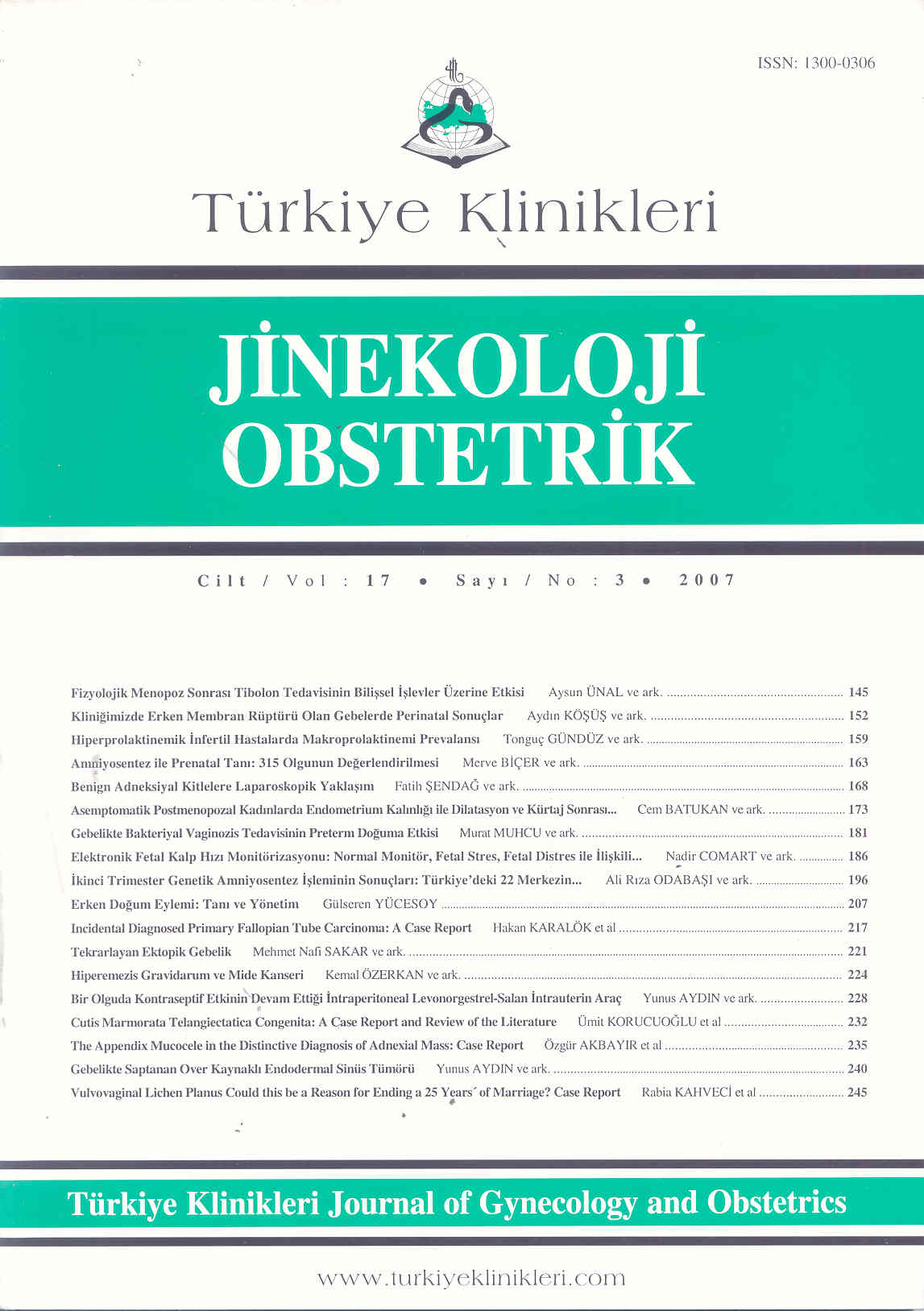Open Access
Peer Reviewed
CASE REPORTS
3568 Viewed2200 Downloaded
Hyperemesis Gravidarum And Gastric Cancer: A Case Report
Hiperemezis Gravidarum ve Mide Kanseri
Turkiye Klinikleri J Gynecol Obst. 2007;17(3):224-7
Article Language: TR
Copyright Ⓒ 2025 by Türkiye Klinikleri. This is an open access article under the CC BY-NC-ND license (http://creativecommons.org/licenses/by-nc-nd/4.0/)
ÖZET
Bu raporda, persiste eden ve tedaviye cevap vermeyen hiperemezis gravidarum (H. gravidarum) tanısı ile izlediğimiz, endoskopisinde mide çıkış yolu obstruksiyonuna yol açan mide adenokarsinomu tespit edilen 16 haftalık gebeliği bulunan bir olgu incelenecektir. 36 yaşında, multipar, gebeliğinin 16. haftasında, kliniğimizde H. gravidarum tanısı ile izlediğimiz olgunun tetkik sürecinde etyolojiyi açıklayacak bir sebep bulunamadı. Bunun üzerine yapılan üst gastrointestinal sistem endoskopisinde antrumda obstruksiyona yol açan adenokarsinom tespit edildi. Gebeliğin terminasyonu sonrası cerrahi (subtotal gastrektomi) ve adjuvan kemoterapi uygulandı. Olgunun 2 yıllık takibinde nüks veya metastaz lehine bulgu saptanmadı. Gebelikte mide kanseri oldukça nadir görülen bir durumdur. Bununla beraber persiste eden ve tedaviye dirençli gastrointestinal semptomları olan vakalarda yapılacak olan tanısal endoskopik girişim tanı ve tedavi açısından faydalı olacaktır. Ayrıca böyle vakalarda mide kanseri ile ilişkisi kanıtlanmış olan Helicobacter pylori (H. pylori) bakterisinin de araştırılması hem H. gravidarumun tedavisi hem de ileride oluşabilecek gastrointestinal sistem hastalıklarının önlenmesinde fayda sağlayacaktır.
Bu raporda, persiste eden ve tedaviye cevap vermeyen hiperemezis gravidarum (H. gravidarum) tanısı ile izlediğimiz, endoskopisinde mide çıkış yolu obstruksiyonuna yol açan mide adenokarsinomu tespit edilen 16 haftalık gebeliği bulunan bir olgu incelenecektir. 36 yaşında, multipar, gebeliğinin 16. haftasında, kliniğimizde H. gravidarum tanısı ile izlediğimiz olgunun tetkik sürecinde etyolojiyi açıklayacak bir sebep bulunamadı. Bunun üzerine yapılan üst gastrointestinal sistem endoskopisinde antrumda obstruksiyona yol açan adenokarsinom tespit edildi. Gebeliğin terminasyonu sonrası cerrahi (subtotal gastrektomi) ve adjuvan kemoterapi uygulandı. Olgunun 2 yıllık takibinde nüks veya metastaz lehine bulgu saptanmadı. Gebelikte mide kanseri oldukça nadir görülen bir durumdur. Bununla beraber persiste eden ve tedaviye dirençli gastrointestinal semptomları olan vakalarda yapılacak olan tanısal endoskopik girişim tanı ve tedavi açısından faydalı olacaktır. Ayrıca böyle vakalarda mide kanseri ile ilişkisi kanıtlanmış olan Helicobacter pylori (H. pylori) bakterisinin de araştırılması hem H. gravidarumun tedavisi hem de ileride oluşabilecek gastrointestinal sistem hastalıklarının önlenmesinde fayda sağlayacaktır.
ANAHTAR KELİMELER: Mide kanseri, hiperemezis gravidarum, endoskopi, gastrointestinal; helicobacter pylori
ABSTRACT
In this report a 16 week pregnant woman with persistant and resistant hyperemesis gravidarum (H. gravidarum), whom a gastric adenocarcinoma obstructing the pyloric region was seen with endoscopy, is evaluated. The patient was 36 years old age with 16 weeks of pregnancy and we could not recognise the etiology of persistant H. gravidarum. Thus we made an upper gastrointestinal tract endoscopy and we saw a adenocarcinoma obstructing the antral region. Following the termination of pregnancy, surgery (subtotal gastrectomy) and adjuvant chemotherapy was performed. During the 2 year follow-up no finding of recurrence or metastasis was seen. Although gastric carcinoma during pregnancy is an extremely rare situation diagnostic endoscopy may be helpful for persistant and refractory cases with gastrointestinal tract symptoms. Additionally, evaluation of Helicobacter pylori (H. pylori) which has a relationship with gastric carcinoma ,will be helpful for treatment of H. gravidarum and for prevention of some gastrointestinal tract diseases.
In this report a 16 week pregnant woman with persistant and resistant hyperemesis gravidarum (H. gravidarum), whom a gastric adenocarcinoma obstructing the pyloric region was seen with endoscopy, is evaluated. The patient was 36 years old age with 16 weeks of pregnancy and we could not recognise the etiology of persistant H. gravidarum. Thus we made an upper gastrointestinal tract endoscopy and we saw a adenocarcinoma obstructing the antral region. Following the termination of pregnancy, surgery (subtotal gastrectomy) and adjuvant chemotherapy was performed. During the 2 year follow-up no finding of recurrence or metastasis was seen. Although gastric carcinoma during pregnancy is an extremely rare situation diagnostic endoscopy may be helpful for persistant and refractory cases with gastrointestinal tract symptoms. Additionally, evaluation of Helicobacter pylori (H. pylori) which has a relationship with gastric carcinoma ,will be helpful for treatment of H. gravidarum and for prevention of some gastrointestinal tract diseases.
MENU
POPULAR ARTICLES
MOST DOWNLOADED ARTICLES





This journal is licensed under a Creative Commons Attribution-NonCommercial-NoDerivatives 4.0 International License.










